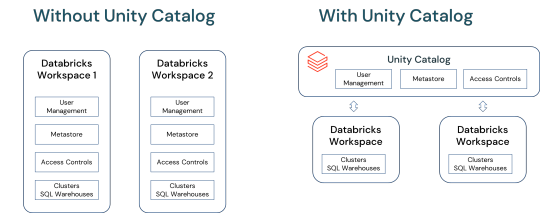#Migrate to Databricks
Explore tagged Tumblr posts
Text
Difference between Databricks and Snowflake
Databricks and Snowflake are two different technologies that are often used together for data analysis and processing.
Databricks is a cloud-based data processing platform that provides tools for data engineering, data science, and machine learning. It is based on Apache Spark, an open-source distributed computing framework that can process large amounts of data in parallel across multiple computers. Databricks provides a unified workspace for data engineers and data scientists to collaborate and work with data, using a combination of programming languages like Python, R, and SQL.
Snowflake, on the other hand, is a cloud-based data warehousing platform that provides a scalable and secure solution for storing and analyzing large amounts of data. Snowflake uses a unique architecture that separates storage and computing, which allows users to scale up or down their compute resources as needed, without affecting the underlying data. Snowflake also provides a SQL-based interface for querying data, and it supports various BI tools for data visualization and reporting.
In summary, Databricks and Snowflake are both cloud-based technologies for data processing and analysis, but they serve different purposes. Databricks is more focused on data engineering, data science, and machine learning, while Snowflake is more focused on data warehousing and analytics. However, they can be used together to build end-to-end data solutions that can handle large amounts of data at scale. For more details, contact at https://celebaltech.com/significance-of-databricks
#databricks migration#Difference between Databricks and Snowflake#Migrate to Databricks#Databricks Rebellion#Migrating to Databricks#Snowflake
0 notes
Text
0 notes
Text

Legacy Warehouse to Databricks Migration Framework
Migrate to Databricks 30% faster and access advanced data analytics with 40% lower TCO with Jade, your trusted Databricks Partner. Explore our accelerated framework for Legacy to Databricks Migration https://shorturl.at/FkXEY
1 note
·
View note
Text

Contact CT Shift - Automate Migration from SAS (celebaltech.com)
0 notes
Text
Unlocking Full Potential: The Compelling Reasons to Migrate to Databricks Unity Catalog
In a world overwhelmed by data complexities and AI advancements, Databricks Unity Catalog emerges as a game-changer. This blog delves into how Unity Catalog revolutionizes data and AI governance, offering a unified, agile solution .

View On WordPress
#Access Control in Data Platforms#Advanced User Management#AI and ML Data Governance#AI Data Management#Big Data Solutions#Centralized Metadata Management#Cloud Data Management#Data Collaboration Tools#Data Ecosystem Integration#Data Governance Solutions#Data Lakehouse Architecture#Data Platform Modernization#Data Security and Compliance#Databricks for Data Scientists#Databricks Unity catalog#Enterprise Data Strategy#Migrating to Unity Catalog#Scalable Data Architecture#Unity Catalog Features
0 notes
Text

Nuvento's Hadoop migration assessment consulting offer is now available on the Azure Marketplace.
If you're considering migrating your Hadoop workloads to Azure, our team is here to assist you.
Our complimentary Hadoop migration assessment serves as the initial phase in comprehending your migration alternatives, setting you on the right course for a seamless transition to Azure Databricks. Begin your exploration of the vast potential within your data today.
Learn more about the Hadoop and Azure Databricks Migration Free Assessment with us.
#hadoop to azure databricks migration#migrating from hadoop to azure databricks#hadoop to azure databricks
0 notes
Text
Hadoop to Databricks Migration
As Databricks offers enhanced performance, scalability, and ease of use, it becomes an apt choice for modern data analytics needs. Hadoop to Databricks migration refers to the process of transitioning data, workloads, and applications from traditional Hadoop clusters to Databricks. The migration involves evaluating the existing Hadoop infrastructure, understanding data dependencies, and adapting code to the Databricks environment. By performing this migration, enterprises can leverage the power of advanced analytics, real-time data processing, and collaborative data science with Databricks. This further helps empower data-driven decision-making and accelerate innovation in their data-driven endeavors.
0 notes
Text
Databrick consulting services
Discover the transformative potential of Databricks with Xorbix Technologies, a leading Databricks consulting services provider. From AI and machine learning to data modernization and cloud migration, our certified Databricks engineers specialize in delivering custom solutions tailored to your unique business needs. Partner with us to leverage the Databricks Lakehouse Platform, Genie, and AutoML for streamlined analytics, seamless data governance, and actionable insights. Let us be your Databricks service provider company of choice!
0 notes
Photo

contact https://celebaltech.com/significance-of-databricks
0 notes
Text
0 notes
Text
Price: [price_with_discount] (as of [price_update_date] - Details) [ad_1] Become well-versed with data engineering concepts and exam objectives to achieve Azure Data Engineer Associate certification Key Features: Understand and apply data engineering concepts to real-world problems and prepare for the DP-203 certification examExplore the various Azure services for building end-to-end data solutionsGain a solid understanding of building secure and sustainable data solutions using Azure services Book Description: Azure is one of the leading cloud providers in the world, providing numerous services for data hosting and data processing. Most of the companies today are either cloud-native or are migrating to the cloud much faster than ever. This has led to an explosion of data engineering jobs, with aspiring and experienced data engineers trying to outshine each other.Gaining the DP-203: Azure Data Engineer Associate certification is a sure-fire way of showing future employers that you have what it takes to become an Azure Data Engineer. This book will help you prepare for the DP-203 examination in a structured way, covering all the topics specified in the syllabus with detailed explanations and exam tips. The book starts by covering the fundamentals of Azure, and then takes the example of a hypothetical company and walks you through the various stages of building data engineering solutions. Throughout the chapters, you'll learn about the various Azure components involved in building the data systems and will explore them using a wide range of real-world use cases. Finally, you'll work on sample questions and answers to familiarize yourself with the pattern of the exam.By the end of this Azure book, you'll have gained the confidence you need to pass the DP-203 exam with ease and land your dream job in data engineering. What You Will Learn: Gain intermediate-level knowledge of Azure the data infrastructureDesign and implement data lake solutions with batch and stream pipelinesIdentify the partition strategies available in Azure storage technologiesImplement different table geometries in Azure Synapse AnalyticsUse the transformations available in T-SQL, Spark, and Azure Data FactoryUse Azure Databricks or Synapse Spark to process data using NotebooksDesign security using RBAC, ACL, encryption, data masking, and moreMonitor and optimize data pipelines with debugging tips Who this book is for: This book is for data engineers who want to take the DP-203: Azure Data Engineer Associate exam and are looking to gain in-depth knowledge of the Azure cloud stack.The book will also help engineers and product managers who are new to Azure or interviewing with companies working on Azure technologies, to get hands-on experience of Azure data technologies. A basic understanding of cloud technologies, extract, transform, and load (ETL), and databases will help you get the most out of this book. Publisher : Packt Publishing (4 March 2022); Packt Publishing Limited Language : English Paperback : 574 pages ISBN-10 : 1801816069 ISBN-13 : 978-1801816069 Item Weight : 990 g Dimensions
: 3.73 x 19.05 x 23.5 cm Country of Origin : India Importer : Packt Publishing Limited Packer : Packt Publishing Limited Generic Name : Books [ad_2]
0 notes
Text
Cirata Expands Databricks Partnership to Facilitate Seamless Cloud Migration and Modernization
http://securitytc.com/TGhMGl
0 notes
Text
Microsoft Azure Managed Services: Empowering Businesses with Expert Cloud Solutions

As businesses navigate the complexities of digital transformation, Microsoft Azure Managed Services emerge as a crucial tool for leveraging the potential of cloud technology. These services combine advanced infrastructure, automation, and expert support to streamline operations, enhance security, and optimize costs. For organizations seeking to maximize the benefits of Azure, partnering with a trusted Managed Service Provider (MSP) like Goognu ensures seamless integration and efficient management of Azure environments.
This article explores the features, benefits, and expertise offered by Goognu in delivering customized Azure solutions.
What Are Microsoft Azure Managed Services?
Microsoft Azure Managed Services refer to the specialized support and tools provided to organizations using the Azure cloud platform. These services enable businesses to effectively manage their Azure applications, infrastructure, and resources while ensuring regulatory compliance and data security.
Azure Managed Service Providers (MSPs) like Goognu specialize in delivering tailored solutions, offering businesses a wide range of support, from deploying virtual machines to optimizing complex data services.
Why Choose Goognu for Azure Managed Services?
With over a decade of expertise in cloud solutions, Goognu stands out as a leading provider of Microsoft Azure Managed Services. The company’s technical acumen, customer-centric approach, and innovative strategies ensure that businesses can fully harness the power of Azure.
Key Strengths of Goognu
Extensive Experience With more than 10 years in cloud management, Goognu has built a reputation for delivering reliable and efficient Azure solutions across industries.
Certified Expertise Goognu's team includes certified cloud professionals who bring in-depth knowledge of Azure tools and best practices to every project.
Tailored Solutions Recognizing the unique needs of every business, Goognu designs and implements solutions that align with individual goals and challenges.
Comprehensive Azure Services Offered by Goognu
Goognu provides a holistic suite of services under the umbrella of Microsoft Azure Managed Services. These offerings address a wide range of operational and strategic needs, empowering businesses to achieve their objectives efficiently.
1. Azure Infrastructure Management
Goognu manages critical Azure components such as:
Virtual Machines
Storage Accounts
Virtual Networks
Load Balancers
Azure App Services
By handling provisioning, configuration, and ongoing optimization, Goognu ensures that infrastructure remains reliable and performant.
2. Data Services and Analytics
Goognu provides expert support for Azure data tools, including:
Azure SQL Database
Azure Cosmos DB
Azure Data Factory
Azure Databricks
These services help businesses integrate, migrate, and analyze their data while maintaining governance and security.
3. Security and Compliance
Security is paramount in cloud environments. Goognu implements robust measures to protect Azure infrastructures, such as:
Azure Active Directory for Identity Management
Threat Detection and Vulnerability Management
Network Security Groups
Compliance Frameworks
4. Performance Monitoring and Optimization
Using tools like Nagios, Zabbix, and Azure Monitor, Goognu tracks performance metrics, system health, and resource usage. This ensures that Azure environments are optimized for scalability, availability, and efficiency.
5. Disaster Recovery Solutions
With Azure Site Recovery, Goognu designs and implements strategies to minimize downtime and data loss during emergencies.
6. Application Development and Deployment
Goognu supports businesses in building and deploying applications in Azure, including:
Cloud-Native Applications
Containerized Applications (Azure Kubernetes Service)
Serverless Applications (Azure Functions)
Traditional Applications on Azure App Services
7. Cost Optimization
Cost management is critical for long-term success in the cloud. Goognu helps businesses analyze resource usage, rightsize instances, and leverage Azure cost management tools to minimize expenses without sacrificing performance.
Benefits of Microsoft Azure Managed Services
Adopting Azure Managed Services with Goognu provides several transformative advantages:
1. Streamlined Operations
Automation and expert support simplify routine tasks, reducing the burden on in-house IT teams.
2. Enhanced Security
Advanced security measures protect data and applications from evolving threats, ensuring compliance with industry regulations.
3. Cost Efficiency
With a focus on resource optimization, businesses can achieve significant cost savings while maintaining high performance.
4. Improved Performance
Proactive monitoring and troubleshooting eliminate bottlenecks, ensuring smooth and efficient operations.
5. Scalability and Flexibility
Azure’s inherent scalability, combined with Goognu’s expertise, enables businesses to adapt to changing demands effortlessly.
6. Focus on Core Activities
By outsourcing cloud management to Goognu, businesses can focus on innovation and growth instead of day-to-day operations.
Goognu’s Approach to Azure Managed Services
Collaboration and Strategy
Goognu begins by understanding a business’s specific needs and goals. Its team of experts collaborates closely with clients to develop strategies that integrate Azure seamlessly into existing IT environments.
Customized Solutions
From infrastructure setup to advanced analytics, Goognu tailors its services to align with the client’s operational and strategic objectives.
Continuous Support
Goognu provides 24/7 support, ensuring that businesses can resolve issues quickly and maintain uninterrupted operations.
Unlocking Innovation with Azure
Goognu empowers businesses to accelerate innovation using Azure’s cutting-edge capabilities. By leveraging cloud-native development, AI/ML operations, IoT integration, and workload management, Goognu helps clients stay ahead in competitive markets.
Why Businesses Choose Goognu
Proven Expertise
With a decade of experience in Microsoft Azure Managed Services, Goognu delivers results that exceed expectations.
Customer-Centric Approach
Goognu prioritizes customer satisfaction, offering personalized solutions and unwavering support.
Advanced Capabilities
From AI/ML to IoT, Goognu brings advanced expertise to help businesses unlock new opportunities with Azure.
Conclusion
Microsoft Azure Managed Services offer unparalleled opportunities for businesses to optimize their operations, enhance security, and achieve cost efficiency. By partnering with a trusted provider like Goognu, organizations can unlock the full potential of Azure and focus on their strategic goals.
With a proven track record and unmatched expertise, Goognu delivers comprehensive Azure solutions tailored to the unique needs of its clients. Whether it’s infrastructure management, data analytics, or cost optimization, Goognu ensures businesses can thrive in today’s digital landscape.
Transform your cloud journey with Goognu’s Microsoft Azure Managed Services. Contact us today to discover how we can help you achieve your business goals.
0 notes
Text

Explore the journey of migrating from Hadoop to Azure Databricks. Learn key steps & benefits for a successful transition in this guide. Read more: https://nuvento.com/blog/benefits-of-hadoop-to-azure-databricks-migration/
#hadoop to azure databricks#migrating from hadoop to azure databricks#hadoop to azure databricks migration
0 notes
Text
Hadoop to Databricks Migration
As Databricks offers enhanced performance, scalability, and ease of use, it becomes an apt choice for modern data analytics needs. Hadoop to Databricks migration refers to the process of transitioning data, workloads, and applications from traditional Hadoop clusters to Databricks. The migration involves evaluating the existing Hadoop infrastructure, understanding data dependencies, and adapting code to the Databricks environment. By performing this migration, enterprises can leverage the power of advanced analytics, real-time data processing, and collaborative data science with Databricks. This further helps empower data-driven decision-making and accelerate innovation in their data-driven endeavors.
0 notes
Text
Cloud Engineer (Databricks) Contract
Job scopes Lead end-to-end data migration projects from on-premises environments to Databricks, ensuring minimal downtime. Work with architects to design solutions that meet both functional and non-functional requirements. Process near … Apply Now
0 notes